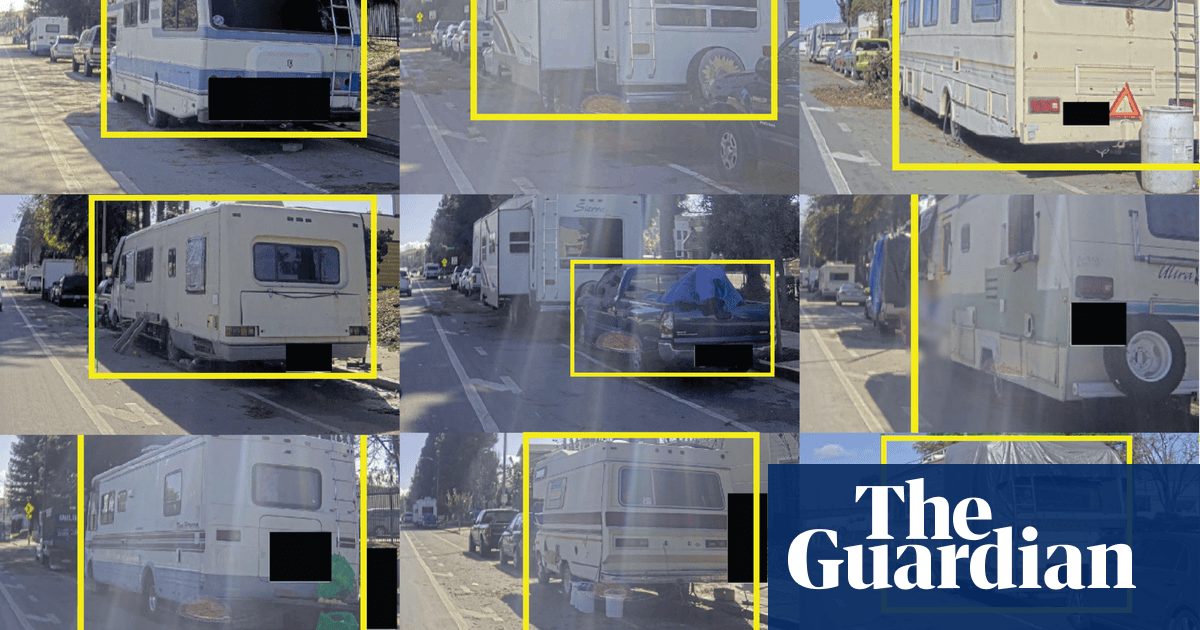Last July, San Jose issued an open invitation to technology companies to mount cameras on a municipal vehicle that began periodically driving through the city’s district 10 in December, collecting footage of the streets and public spaces. The images are fed into computer vision software and used to train the companies’ algorithms to detect the unwanted objects, according to interviews and documents the Guardian obtained through public records requests.
So instead of spending X dollars to ensure people have homes, we spend X++ dollars to evict them from their spaces?
Sure, it’s like how NYC spent $150 million to bust people evading $105,000 in subway fees. Absolutely anything to avoid legitimately helping people.
The suffering is the point. They want the threat of homelessness to keep the masses in line.
That is a stupid issue with Mayor Adams, but NYC legitimately spends millions on housing the homeless. The city has to get you shelter. It’s the law.
NYC has less than 5% unsheltered in contrast to San Francisco which has 30% unsheltered homeless per night. the driving force of this is the freezing winter in New York, which presents a hazard habitating outside. New York has to choose between making sure everyone gets a warm place, or they get to pick up the dead bodies.
California has a particularly high per-capita homeless population despite efforts toward housing. A large factor is NIMBY homeownership in which HOAs are determined to preserve property values and are a strong lobbying force.
None of that makes any sense. California and NYC have similar property values. If anything, NYC price per square footage is higher on average. There are basically no houses on Manhattan, so almost all places to live have a condo board or co-op board. It’s similar to an HOA.
California always had nice weather. Homeless people only existed in large numbers after Governor Reagan emptied the mental institutions and provided few resources for the residents. They literally took away their homes. Before that, NYC had more homeless people.
https://calmatters.org/commentary/2019/03/hard-truths-about-deinstitutionalization-then-and-now/
California could house almost all of its homeless people if they spent the money. It’s not even that expensive compared to the alternative.
Just to clarify, when comparing New York City to San Francisco, I’m talking about the percentage of the city’s homeless that aren’t covered by available shelters, whether state-sponsored, churches or non-profit. I wasn’t talking about whether New York City has more homeless than San Francisco (which I do not know) but that the shelters in New York cover most of the homeless, while that is not true in San Francisco.
The second paragraph is about California as a whole state. And yes, we could solve our homeless problem, but landowners actively lobby against it, and our state government is about as corrupt as any of the others.
Other states are sending their homeless to California.
Same with NYC. There’s no excuse besides being cheap and lazy.
Downvoted for stating an easily verifiable fact lol
Yes, facts are one thing. But what about what I believe is true? Isn’t that more important?
What I believe is important but what I feel is really what matters.
How long has this been a law? The last time I went to NY I saw plenty of people sleeping in Penn Station.
Since 1981:
https://www.cityandstateny.com/policy/2021/10/how-nycs-right-shelter-mandate-works/185933/
And why would you think people wouldn’t be able to sleep in a train station? It’s just like an airport.
At least one person I saw was in the stairwells on the way from a waiting area down to a train platform. I don’t think passengers would want to sleep in the corridor between the gate and the plane at an airport, but you’re right, perhaps it is only the locked door that is holding them back.
Now I am kinda curious why they were staying there if they were supposed to be guaranteed shelter. I wouldn’t be surprised if the state failed to house them despite the law and that was the warmest place they could find or if the offered accommodations were unfit or dangerous.
I wouldn’t be surprised
You are just guessing. Look into it more. They are put up in places that are pretty decent for homeless shelters. They’re usually cheap hotels, so you get your own room but no kitchen. It’s not somewhere you want to live, but it’s 100x better than a train station.
Most homeless people are fine in them, but they have security watching the door so you can’t have a party, you can’t have pets, and you can’t have drugs. Maybe you can’t smoke. Some people don’t want to live under those conditions. Other people have mental illness and don’t want to be in any shelter.
It will pay for itself in 1,500 years!
How else would the mega rich be able to buy up the property and rent out the spaces for normal people to finance?
It’s literally cheaper to provide the unhoused with healthcare. Not just for them, but for housed people and all taxpayers. But we (as a society) don’t. At this point I feel it’s literally about cruelty, and punishing them for their “life choices”. And you think we’ll just give them homes!?
But Sosh uh izm!
Next time you ask yourself that question, remember that these cunts are spending your tax dollars to hurt those who have nothing left to lose. Vote them out
And considering that veterans are over represented in the homeless population, they actively hurt those who have served the country instead of helping them. Shameful!
quite ironically in this context, san jose is named after st. joseph – he of the legal dad of jesus fame – who was once famously told there was no room at the inn and had to make do in a stable.
Sounds about right for American-christianity.
Only if you’re charging a luxury room price for the stable.
And help them right ? RIGHT ?
If only we didn’t live in a dystopia and that was what this was for.
One can only dream i guess.
San Jose’s homeless is a very mixed bag. some wanting to be perpetually homeless, some actual recently loss home and is savable, some on the streets due to drugs (friend had a story where homeless asked for a burger, but refused one from a burger joint nearest by (implied wanted money for drugs)).
Weeding out whose helpable isnt an easy task, because not all homeless share the same reason on how they got to that lifestyle.
This is part of the problem with using terms like “homeless” to describe the occupants of an illegal campsite. There are numerous reasons one may choose to camp in a public space.
- Some are truly struggling to regain their financial footing and either the assistance programs are not helpful or they are unable to utilize them.
- Some are sick which causes them to be unable to participate functionally in society, and they have “fallen through the cracks” of services designed to support them.
- Some reject housing in favor of a lifestyle that demands less effort or accountability – possibly in service of addiction, which ties into #2 above.
All members of society should have access to shelter (or a safe campsite, if that is our preference) and our basic needs met. As members of society, we shall follow laws which describe, for very good reasons, why we cannot simply erect a camping tent in a city park.
The problem with ignoring campsites is plummeting hygiene and safety. Waste is generated by day to day life and must be collected or eliminated. As campers accumulate and abandon the implements of a semi-permanent hovel: furniture, bedding, tarps, etc., the surrounding area transforms into a dumping site.
The technology described in the article already identifies potholes and illegal parking. It does not identify people or their race. Surely it could evolve into something with more potential for abuse, but in its current capacity, it is quite a neutral tool.
We have collected a lot of data on the “ignore and do nothing” solution – the outcome is a scientific certainty. Using tools like this to measure progress (for better or worse) seems like something that would help generate support for other solutions, such as extensive expansion of low-cost/no-cost housing services.
its definitely a problem thats hard to tackle, and each location handles it very differently. there have been situations in some cities where having shelters wasnt prefered because people who polled felt like said locations were unsafe, and others felt like restrictions for spots were to restrictive (e. g first come first served)
fundamentally, i believe its a problem that wont be solved by a person hired to do it because their job disappears the moment it is solved. as long as property is seen as an investment and prices remain high, along with nimby laws that coincide with it, it effectively cant fix itself.
in context of San Jose itself, there have been many years in which the number of vacant households out number the number of homeless. thats fundamentally a problem of people who owns homes and choosing not to rent them out for various reasons.(some reasonable, others not). it effectively inflates home prices in the city which doesnt need to exist unless the government decides to do something about it, and that would require. stepping on the feet of home owners, so its ultimately a tug a war between them and the government till something gets done.
Yes and no. San Jose has many many programs to assist the homeless, but some of them are dying in the creeks with flooding. We also have relatively new initiatives for reporting encampment to outreach groups instead of the police.
Not everywhere is a safe place for someone to settle. It’s one thing to have a person spend the night somewhere, but services like these may help identify encampments that are establishing in areas at risk of flooding etc before they get too entrenched.
AI policing has begun.
They’ve already been using it to give probably cause and as evidence that all black people are the same and therefore guilty. I’m referring to facial recognition
In terms of legal precedent this may be a good thing in the long run.
The software billed as “AI” these days is half baked. If one or more law enforcement agencies point to the new piece of software the city deployed as their probable cause to make an arrest it won’t take long for that to get challenged in court.
This sets the stage for the legality of the software to be challenged now (in half baked form) and to set a legal standard demanding high accuracy and/or human assessment when making an arrest.
This kind of software is already illegal in the EU. AI cannot be used for surveillance or to make decisions about people or arrest them.
Good for the EU I guess?
I was talking about it in the US, where the article is focused.
Yes, but the EU is setting legal precident here that American legislation should follow.
Oh boy, I have some news for you …
Defeatism only helps the thugs who benefit from chaos.
I think you’re more optimistic than I am about a conservative appeals court judge being able to first understand that the technology works very well, then actually give a shit if they do.
I’m arguing against the technology. I believe that the decision to make an arrest should fall to a human being and that individual should be allowed to override a bad call by the shit being billed as AI.
There’s a real possibility that law enforcement agencies may try to foist responsibility for decisions onto software and require officers to abide by the recommendations of said software. That would be a huge mistake.
this brave new future which we live in fucking sucks
Every year California is becoming more like Night City. Cyperpunk is supposed to be a dystopia, not an aspiration.
When housing becomes a for profit business, this is the result. It’s happening in my city in Canada as well.
I have a homeless community sprouting up behind our cul de sac and it gets bigger each spring. It likely disappears in the winter, I’ve no desire to walk through the uncleared snow to find out. And a few blocks away people are camping out on sidewalks everywhere, it’s becoming an epidemic, in a city that was once very affordable.
Being homeless is like the software piracy equivalent of housing. You’re not paying but rich people are “losing money” since homeless people aren’t paying them $4000+/month therefore it’s a crime.
Do you really think the concerns about encampments are all from rent seeking landlords?
Here in Minneapolis it’s the number of murders, gang violence (territory), rape, and human trafficking.
Second tier issues are overdoses, fires, sanitation (which doesn’t sound like much until you see the people with fingers and toes rotting off), and crime rates increasing as they try to make enough money to feed their drug habits.
It’s a very complex issue. Much more complex than “the landlords are upset people aren’t paying rent”.
Tulsa Oklahoma is full of homeless encampments and this is supposed to be one of the cheaper states to live in. Yet landlords want to price their places like the bigger cities. It is scary to see what cost to rent in this town compared to the pay being offer for jobs. Its wonder there isn’t more homeless.
We’re all shocked that New Technology X is used to target and oppress people
“unwanted objects”
Is it done to give them home quicker? Is it?
*sigh*
The rates of suicide are going to skyrocket
the accuracy for lived-in cars is still far lower: between 10 and 15%
Sounds like the tech isn’t terribly useful
That surely won’t stop governments from throwing millions at it or private companies from taking the money.
I wonder if it could spot Steve
I’m so grateful he’s Canadian
It doesn’t have to be accurate to be useful
Case in point: https://en.wikipedia.org/wiki/ADE_651
Basically a dowsing rod, totally incapable of detecting bombs, drugs, etc. But possibly still useful as a probable cause generator.
That was probably one of the more depressing Wiki articles I’ve read in a minute.
Maybe it’s to help them.
Don’t tell me, I like the illusion.
From the screen grabs, Since when is a legally street parked RV a homeless encampment? Looks like picking low hanging fruit for campaign talking points.
This sounds like a real opportunity for false positives as opposed to, I dunno, engaging with the community?















